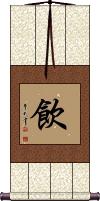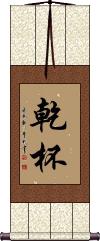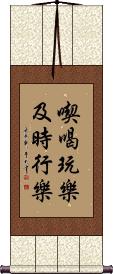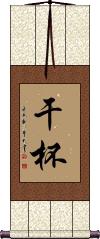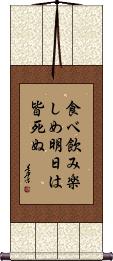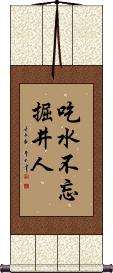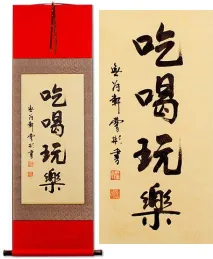Many custom options...
And formats...

Drink in Chinese / Japanese...
Buy a Drink calligraphy wall scroll here!
Personalize your custom “Drink” project by clicking the button next to your favorite “Drink” title below...
1. Drink
5. Eat Drink and Be Merry, For Tomorrow We Die
6. Drinking the water of a well: One should never forget who dug it
Drink
飲 is how to formally write “drink” (the verb for taking a drink or drinking) in Chinese and Japanese.
This is different than the noun for a drink. There are other ways to say/write drink, but they are more for oral/spoken language. This more formal version is appropriate if you want to write the word “drink.”
This is kind of an odd selection for a wall scroll but no bad meaning.
![]() In Korean Hanja, this character is generally written in the variant shown to the right.
In Korean Hanja, this character is generally written in the variant shown to the right.
![]()
![]() This can be pronounced in Japanese but this is seldom seen as a lone Kanji, and thus is not appropriate if your audience is Japanese. They will, at least, use a second Hiragana character in Japanese, as shown to the right. This is "nomi."
This can be pronounced in Japanese but this is seldom seen as a lone Kanji, and thus is not appropriate if your audience is Japanese. They will, at least, use a second Hiragana character in Japanese, as shown to the right. This is "nomi."
![]() The common oral character looks like the one shown to the right. But this is not appropriate for a wall scroll.
The common oral character looks like the one shown to the right. But this is not appropriate for a wall scroll.
 In some cases (often in ancient Chinese) the character shown to the right is used to mean drink. But this word refers to anything you consume in your mouth. This character is most often used to mean "eat" in modern Chinese.
In some cases (often in ancient Chinese) the character shown to the right is used to mean drink. But this word refers to anything you consume in your mouth. This character is most often used to mean "eat" in modern Chinese.
Drink Up! / Cheers!
乾杯 is the common way to say “cheers” or give a toast in Chinese, Japanese and old Korean (written the same in all three languages, though pronounced differently).
乾杯 is an appropriate wall scroll for a bar, pub, or another drinking area.
The first character literally means “dry” or “parched.”
The second character means “cup” or “glass.”
Together the meaning is to drink up (empty your glass).
Eat Drink and Be Merry
喫喝玩樂及時行樂 is just about the closest proverb to match the western idea of “Eat, drink, and be merry.”
This is a Chinese proverb that more literally means “Eat, drink, play, be merry, enjoy everything as long as you can.”
It's basically a suggestion that you try to enjoy everything in life, as long as you live, or as long as you are able.
Eat Drink and Be Merry
Drink Up! / Cheers!
Alternate version
Eat Drink and Be Merry, For Tomorrow We Die
Drinking the water of a well: One should never forget who dug it
This proverb suggests that one should always be grateful to those who helped one succeed.
And remember your ancestors and those that came before you whose sacrifices made your present life better.
Some Chinese will separate the intended meaning from this proverb and translate this as “Don't forget the people who once helped you.” In Modern China, this idiom is virtually never used to refer to an actual well.
Note: This can be pronounced in Korean but it's not a commonly used phrase.
This in-stock artwork might be what you are looking for, and ships right away...
Gallery Price: $176.00
Your Price: $97.77
Gallery Price: $126.00
Your Price: $69.88
Gallery Price: $61.00
Your Price: $33.88
Gallery Price: $61.00
Your Price: $33.88
Gallery Price: $61.00
Your Price: $33.88
These search terms might be related to Drink:
Beer
Drink Up! / Cheers!
Even a Fool May Sometimes Come Up With a Good Idea
Fall Down Seven Times, Get Up Eight
Forgiveness (From the Top Down)
Give Up Desire
Good Good Study, Day Day Up
Never Give Up
One Swallow Doesn’t Make a Summer
One Who Walks by the River May End Up With Wet Feet
Pick
Rise Up With Thrift and Diligence
Swallow
Take Up a Challenge
Thirst for Truth
Wake Up to Reality
Not the results for drink that you were looking for?
Below are some entries from our dictionary that may match your drink search...
| Characters If shown, 2nd row is Simp. Chinese |
Pronunciation Romanization |
Simple Dictionary Definition |
酒 see styles |
jiǔ jiu3 chiu zake ざけ |
More info & calligraphy: Wine / Alcohol / Sake(suffix) alcohol; (alcoholic) drink; liqueur; (surname) Zake surā; maireya; madya. Wine, alcoholic liquor; forbidden to monks and nuns by the fifth commandment. |
乾杯 干杯 see styles |
gān bēi gan1 bei1 kan pei kanpai かんぱい |
More info & calligraphy: Drink Up! / Cheers!(noun/participle) (1) toast; drink (in celebration or in honor of something); (2) drinking one's glass dry; (interjection) (3) cheers |
インカ see styles |
inka インカ |
More info & calligraphy: Inka |
ショア see styles |
joa ジョア |
More info & calligraphy: Shore |
タヒる see styles |
tapiru タピる |
(Godan verb with "ru" ending) (slang) (See タピオカティー) to drink bubble tea |
ぱんち see styles |
panchi パンチ |
(noun/participle) (1) punch (with the fist); (noun/participle) (2) punching (a hole); hole punch; (3) punch (drink); (4) punch (in a song, speech, etc.); impact; (personal name) Hantzsch |
吃喝玩樂 吃喝玩乐 see styles |
chī hē wán lè chi1 he1 wan2 le4 ch`ih ho wan le chih ho wan le |
More info & calligraphy: Eat Drink and Be Merry |
吃香喝辣 see styles |
chī xiāng hē là chi1 xiang1 he1 la4 ch`ih hsiang ho la chih hsiang ho la |
More info & calligraphy: Live Well |
侑 see styles |
yòu you4 yu yumi ゆみ |
(literary) to urge sb (to eat or drink) (female given name) Yumi |
呫 see styles |
zhān zhan1 chan |
to drink; to sip; to taste; to lick; whisper; petty |
味 see styles |
wèi wei4 wei mi み |
taste; smell; (fig.) (noun suffix) feel; quality; sense; (TCM) classifier for ingredients of a medicine prescription (1) (sense of) taste; (counter) (2) counter for kinds of food, drink or medicine rasa. Taste, flavour; the sense of taste. One of the six sensations. |
呷 see styles |
xiā xia1 hsia |
to sip; to drink; Taiwan pr. [xia2] |
啜 see styles |
chuò chuo4 ch`o cho |
(literary) to drink; to sip; to sob |
喝 see styles |
hè he4 ho katsu かつ |
to shout (interjection) (1) exclamation used to scold practitioners (in Zen); (2) scolding or threatening with a shout To shout, bawl, call, scold; to drink. |
噇 see styles |
chuáng chuang2 ch`uang chuang |
(dialect) to eat or drink extravagantly |
嚃 see styles |
tà ta4 t`a ta |
(literary) to drink; to swallow |
宛 see styles |
wǎn wan3 wan ango あんご |
winding; as if (1) aim; object; purpose; end; (2) expectations; prospects; hopes; (3) something that can be relied upon; (4) (ksb:) snack served with alcoholic drink; (suffix noun) (5) pad; guard; (n-suf,n-pref) (6) blow; strike; (suffix) (7) addressed to; (8) (kana only) per; (personal name) Ango completely |
戒 see styles |
jiè jie4 chieh kai; ingoto(ok) かい; いんごと(ok) |
to guard against; to exhort; to admonish or warn; to give up or stop doing something; Buddhist monastic discipline; ring (for a finger) (1) (かい only) {Buddh} admonition; commandment; (2) sila (precept) śīla, 尸羅. Precept, command, prohibition, discipline, rule; morality. It is applied to the five, eight, ten, 250, and other commandments. The five are: (1) not to kill; (2 ) not to steal; (3) not to commit adultery; (4) not to speak falsely; (5) not to drink wine. These are the commands for lay disciples; those who observe them will be reborn in the human realm. The Sarvāstivādins did not sanction the observance of a limited selection from them as did the 成實宗 Satyasiddhi school. Each of the five precepts has five guardian spirits, in all twenty-five, 五戒二十五神. The eight for lay disciples are the above five together with Nos. 7, 8, and 9 of the following; the ten commands for the ordained, monks and nuns, are the above five with the following: (6) not to use adornments of flowers, nor perfumes; (7) not to perform as an actor, juggler, acrobat, or go to watch and hear them; (8) not to sit on elevated, broad, and large divans (or beds); (9) not to eat except in regulation hours; (10) not to possess money, gold or silver, or precious things. The 具足戒full commands for a monk number 250, those for a nun are 348, commonly called 500. Śīla is also the first of the 五分法身, i.e. a condition above all moral error. The Sutra of Brahma's Net has the following after the first five: (6) not to speak of the sins of those in orders; (7) not to vaunt self and depreciate others; (8) not to be avaricious; (9) not to be angry; (10) not to slander the triratna. |
椀 碗 see styles |
wǎn wan3 wan wan わん |
variant of 碗[wan3] (1) (See 碗・1) bowl (wooden); (counter) (2) counter for bowls of food or drink bowl |
欶 see styles |
shuò shuo4 shuo |
to suck; to drink |
欼 see styles |
chǐ chi3 ch`ih chih |
drink |
歃 see styles |
shà sha4 sha |
to drink |
歠 see styles |
chuò chuo4 ch`o cho |
(literary) to drink; to sip; gruel; soup |
犒 see styles |
kào kao4 k`ao kao |
to reward or comfort with presents of food, drink etc |
用 see styles |
yòng yong4 yung you / yo よう |
to use; to make use of; to employ; (coverb) with; using; to need; to have to (usu. used in the negative or in questions); usefulness; utility; (bound form) expense; outlay; (courteous) to eat; to drink; (literary) hence; therefore (1) business; task; errand; engagement; (2) use; purpose; (suffix noun) (3) for the use of ...; used for ...; made for ...; (4) (See 用を足す・2) call of nature; excretion; (place-name) Yō To use, to employ; use, function. |
碗 see styles |
wǎn wan3 wan wan わん |
bowl; cup; CL:隻|只[zhi1],個|个[ge4] (1) (See 椀・わん・1) bowl (ceramic, porcelain); (counter) (2) counter for bowls of food or drink |
笊 see styles |
zhào zhao4 chao zaru ざる |
loosely woven bamboo ladle (1) (kana only) draining basket (traditionally made of bamboo); colander; strainer; sieve; (2) (kana only) (See ざる法,ざる碁) something full of holes; (3) (abbreviation) (kana only) {food} (See ざる蕎麦) zaru soba; (4) (colloquialism) (kana only) strong drinker; someone who can drink like a fish; (surname) Zaru |
酌 see styles |
zhuó zhuo2 cho shaku しゃく |
to pour wine; to drink wine; to deliberate; to consider (1) pouring alcohol; (2) (dated) person pouring alcohol (esp. a woman) ladle |
酪 see styles |
lào lao4 lao raku らく |
(bound form) semi-solid food made from milk (junket, cheese etc); (bound form) fruit jelly; sweet paste made with crushed nuts; Taiwan pr. [luo4] (See 五味・2) acidic drink made from fermented milk (cow, sheep, mare; one of the five flavors in Buddhism) dadhi, a thick, sour milk which is highly esteemed as a food and as a remedy or preventive. |
酺 see styles |
pú pu2 p`u pu |
drink heavily; drink in company |
Click here for more drink results from our dictionary
The following table may be helpful for those studying Chinese or Japanese...
| Title | Characters | Romaji (Romanized Japanese) | Various forms of Romanized Chinese | |
| Drink | 飲 / 飮 饮 | no / in | yǐn / yin3 / yin | |
| Drink Up! Cheers! | 乾杯 | kan pai / kanpai | gān bēi / gan1 bei1 / gan bei / ganbei | kan pei / kanpei |
| Eat Drink and Be Merry | 喫喝玩樂及時行樂 吃喝玩乐及时行乐 | chī hē wán lè jí shí xíng lè chi1 he1 wan2 le4 ji2 shi2 xing2 le4 chi he wan le ji shi xing le chihewanlejishixingle | ch`ih ho wan le chi shih hsing le chih ho wan le chi shih hsing le |
|
| Eat Drink and Be Merry | 吃喝玩樂 吃喝玩乐 | chī hē wán lè chi1 he1 wan2 le4 chi he wan le chihewanle | ch`ih ho wan le chihhowanle chih ho wan le |
|
| Drink Up! Cheers! | 干杯 | gān bēi / gan1 bei1 / gan bei / ganbei | kan pei / kanpei | |
| Eat Drink and Be Merry, For Tomorrow We Die | 食べ飲み楽しめ明日は皆死ぬ | tabe nomi tanoshime ashita wa mina shinu | ||
| Drinking the water of a well: One should never forget who dug it | 吃水不忘掘井人 | chī shuǐ bú wàng jué jǐng rén chi1 shui3 bu2 wang4 jue2 jing3 ren2 chi shui bu wang jue jing ren chishuibuwangjuejingren | ch`ih shui pu wang chüeh ching jen chih shui pu wang chüeh ching jen |
|
| In some entries above you will see that characters have different versions above and below a line. In these cases, the characters above the line are Traditional Chinese, while the ones below are Simplified Chinese. | ||||
Successful Chinese Character and Japanese Kanji calligraphy searches within the last few hours...
